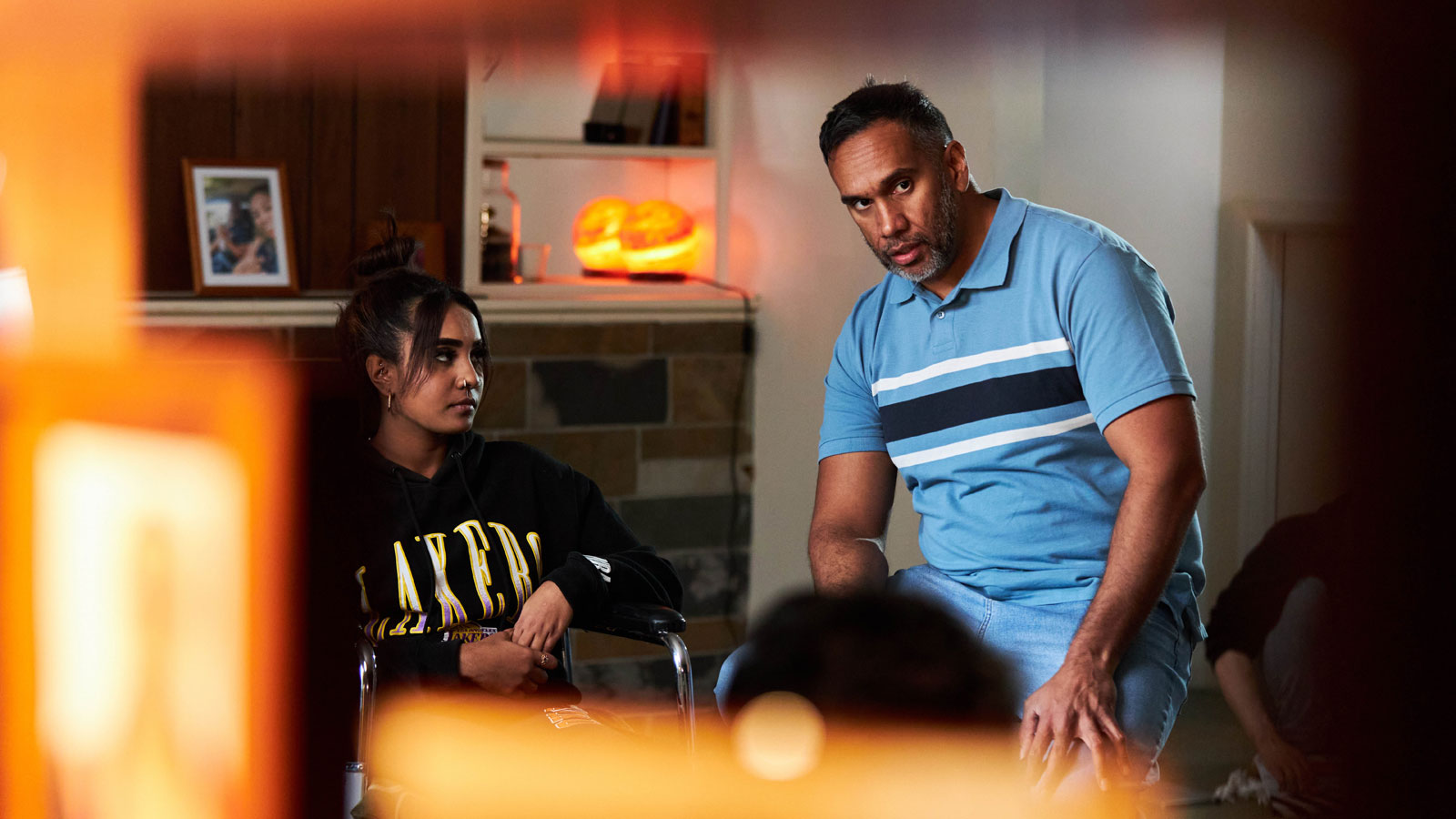Colonial Malaise: Andy Burkitt’s The Organist

Critics Campus 2024 participant Alice Bellette unpacks a gory and Gothic new Australian horror comedy, finding a satirical representation of the present that fails to wholly reckon with the nation’s past.
From Razorback (Russell Mulcahy, 1984) to Wolf Creek (Greg McLean, 2005), Wake in Fright (Ted Kotcheff, 1971) to The Loved Ones (Sean Byrne, 2009), Australian horror movies have tended towards capturing a uniquely existential dread – one that emerges from a putrefaction of this country’s deeply violent colonial past and bears the weight of that history. Away from the safety of the city, rural settings give way to settler anxieties through classic tropes from the colonial-era Gothic: haunted homesteads; Aboriginal bodies as shadows in the bush; cannibal convicts; lawlessness on a foreign and harsh landscape.
Andy Burkitt’s The Organist sets the scene for its underlying horrors in the sterile environment of a corporate office, where Graham (Jack Braddy) sits opposite Tracy (Lena Moon) – the latter a blunt-force caricature as well as HR manager of what is enigmatically referred to as ‘The Company’, a vital-organ brokerage. Seeing a gap in the market, ‘The Company’ has sought to exploit both the cost-of-living crisis and the shortage of available vital organs needed for transplant. In The Organist’s world of workplace hostility and gaslighting, Graham is trapped as the punchline to the corporate joke, whether through its passive-aggressive jargon or its strongarming of employees. The impersonal exploitation of workers is as monstrous as the literal cannibal he works for: in breach of nature and of law; transgressing the impossible and the forbidden.
When considering the events of this film take place on stolen land, another layer of discomfort reveals itself. The movie attempts to address these tensions by casting one of the intended recipients of organs – belonging to Riley (Luke Fisher), a man who has mathematically calculated his decision to die by suicide, and who is coincidentally a universal donor – as an Aboriginal girl, Jessica (Shawana Brown-Edwards), who is awaiting a heart transplant. This subplot plays out as a microcosm of research conducted by ethnographer Tess Lea, who noticed a pattern of well-meaning white people entering disadvantaged Aboriginal communities, finding themselves trapped within the constraints of their bureaucratic limitations and becoming burned out, eventually leaving without having effected any material change in people’s lives.
In its closing moments, the sinewy threads of The Organist’s narrative coalesce in a pile of blood and guts, as Graham is left to frantically dig through entrails in an attempt to extract the treasure trove within. Graham has tracked Riley to a property in the bush, only to find him having been struck by a vehicle, which has crushed the upper part of his torso and ripped open his abdomen; as he plunders his only friend’s insides, he realises that the organs he needs have been completely written off.
In a globalised media era engendered by streaming culture, modern Australian horror does not exist in a vacuum; rather, it is the most recent layer of a palimpsest. The Organist’s filmmakers suggest that they see the future of Australian cinema as “moving away from tropey stories of either heroin riddled suburbia or gothic outback melodramas” – a quaint ambition, considering the timeline of coloniality. To realise such a resplendent vision of the future, we must first collectively reckon with the past.

The Organist
The blood and guts on the bush floor in this film are therefore cast in a more sinister light, and play on historic colonial tropes; the wilderness is rendered as a temptation for the innocent and well-meaning protagonist to embrace his primitive impulses. The Organist can only reach its crescendo as Graham moves from the city to the suburbs and finally to the bushland property, where he is faced with what it means to survive by any means necessary – an undertaking which, it turns out, does not end before murder.
By placing an Aboriginal family in frame, the film connotes a certain settler anxiety – a documented preoccupation in Australian cinema, wherein visions of the wilderness are untarnished by civilisation and, crucially, the presence of Aboriginal bodies. This is reflected in The Organist; well before the action shifts from city to bush, the family are already completely out of the picture.
This type of recycling of Gothic imaginations is common to stories about real-life Irish settler-convict Alexander Pearce, who escaped to the bush and was accused of cannibalism. Ever since the 1874 publication of Marcus Clarke’s novel For the Term of His Natural Life (notably produced as a tacky TV miniseries in the early 1980s), which drew in part from the Pearce legend, the paranoid Australian psyche has been particularly evident in popular media representations of this narrative, lingering in recent films such as Van Diemen’s Land (Jonathan auf der Heide, 2009) and Dying Breed (Jody Dwyer, 2008) as well as songs by The Drones and Weddings Parties Anything. While The Organist was produced with a creative vision decrying the persistence of tropes, it nonetheless similarly invokes them to capture a sense of an antipodean nightmarescape. As such, there is something rather egregious in casting Aboriginal characters as simplistic stand-ins for addressing ‘multiculturalism’ and its fantastical promises of representation, reducing First Nations bodies to part of the set dressing of the production.
Amid the film’s cutesy irony, the politics of depicting cannibalism on stolen land are unattended to. Instead, through its heavy-handed use of expletives – not to misrepresent myself as being impartial to a well-deployed “cunt” – the film relies on the crass legacy of Ozploitation to assert its appeal to international audiences. Once again, the horrors of settler-colonial history are paved over. The character of Jack (Aaron James Campbell), the mysterious, cashed-up company ghoul, represents this insidiousness well: the extent of his wealth is shrouded by his unassuming manner of dress, and, with his houseboat-superyacht, ironised as something like an eccentric form of class tourism.
The Organist represents no small feat of independent, self-financed production – something worth noticing and celebrating in its own right, especially due to the dire present state of screen funding in Australia – and its result is a self-consciously weird low-budget horror that makes no bones about its critique of the economic and social hellscape of the backwater colony we find ourselves in. There’s no ethical consumption under capitalism, after all. What I am hungering for, though, is a reckoning with history – like the Gothic and the gore found in the anticolonial horror films of the late Jeff Barnaby – so that we can move on from the done-to-death tropes and, finally, start making some movies.